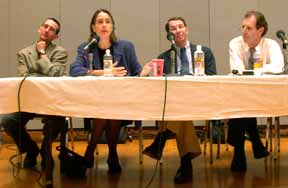Students crowded Wednesday into the Union Royal Ballroom for a chance to discuss the United States’ imperialistic tendencies in Iraq.
“A New Era in U.S. Imperialism? Perspectives on the Bush administration’s foreign policy” was a response to the major shift in U.S. leadership during the past three years, said Mark Gasiorowski, political science professor and co-organizer of the event.
“There has been a really big change in foreign policy since Bush was inaugurated,” he said.
“Imposing on Iraq was not a good idea, and imposing on other states would only make things worse,” said Karen Adams, an LSU political science professor and a speaker at the event.
John Protevi, another member of the panel and LSU French studies professor, said he was not sure if the panel could present any conclusion to the question of U.S. imperialism.
“Everyone has their own idea of what imperialism is,” Protevi said.
Adams defined an empire as a ruling power that shows “absolute authority” and “dominates over another entity.” She said the United States fits this definition.
“We have the final word on policy in Iraq, and we determine how and when the power will be transferred,” Adams said.
Tulane political science professor and LSU alumnus David Clinton offered a contrasting opinion about U.S. forces in Iraq.
Clinton said since the United States shows no interest in ruling over Iraq for anything more than short-term, it cannot be considered imperialistic.
“This no more makes the United States an imperial power than did the de-nazification of World War II Germany,” Clinton said. “It is a temporary occupying power rather than an imperialistic ruler.”
Sarah Schrempf, a German foreign exchange student and mass communication senior, said there were many discussions in Germany about the U.S. involvement in both Afghanistan and Iraq.
“It was not so much a question about ‘Is it imperialism or not’ because it definitely is,” she said. “But it was interesting to hear how [the panelists] explained it.”
Although Adams said she believes in the American values of peace and prosperity, she does not think force like the United States used in Iraq will cause foreigners to embrace American ways.
“Americans are still looking for closure from 9/11,” she said. “And this was a war we knew we could win when we needed to win a war.”
Eglantine Pauvarel, an international relations senior from France, said this imperialistic debate was well- discussed in France.
“The debate was more on how to use the term. We still agree that it is imperialism,” she said. “It’s just the way of deciding how to say it.”
Tyler deFrances, a political science senior, said he was encouraged by the number of students interested in foreign affairs.
“It’s good to see because it means people are actually interested in what’s going on in the world,” deFrances said. “The turnout tonight proved it.”
He said it is good for students to keep up with current events such as Iraq because it affects them whether they like it or not.
The discussion was the first in a series sponsored by the Department of International Studies.
“We’re hoping in semesters to come to have two of these events every semester,” Gasiorowski said.
Panel members debate foreign policy
September 26, 2003

Panel members debate foreign policy



